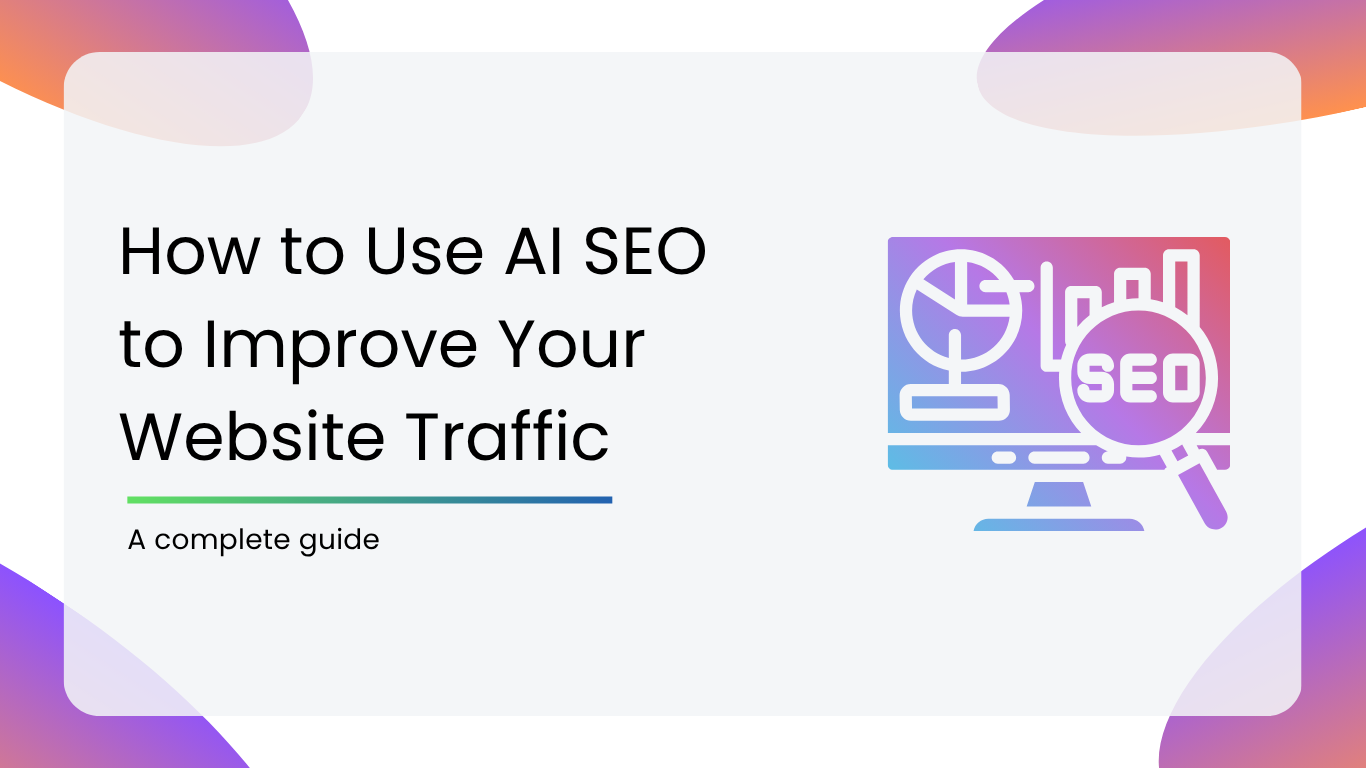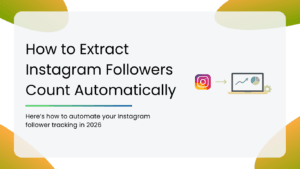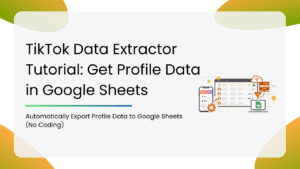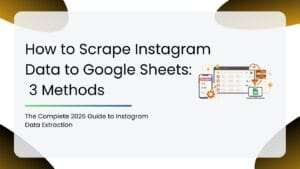Did you know websites using AI SEO strategies see 3X more organic traffic than those relying on manual methods alone? Search engines are evolving, and so should your SEO strategy. In a landscape where algorithms shift overnight and user behavior changes in real-time, relying only on outdated tactics is no longer enough.
This is where AI-driven SEO comes in—empowering you to analyze patterns, predict trends, and optimize content with unmatched precision. In this blog, we’ll walk you through how AI can transform your website into a traffic magnet—from smarter keyword research and automated content insights to real-time performance tracking.
By the end, you’ll learn:
- What AI SEO is (and why it’s a game-changer)
- Key Ways AI Boosts SEO (with actionable steps)
- Top AI SEO Tools in 2025 (and how to use them)
- Real Success Stories (proven strategies from top brands)
- Common Mistakes to Avoid (so you don’t waste time)
What is AI SEO
AI SEO stands for Artificial Intelligence Search Engine Optimization. It means using smart tools and technologies, machine learning, and data analysis to help improve your website’s ranking on Google and other search engines.
Instead of doing everything manually, like finding the right keywords or guessing what content works, AI tools can quickly scan through thousands of data points to tell you what’s working, what people are searching for, and how you can rank higher. It’s like having a super-smart assistant that helps you make better SEO decisions, faster and more accurately.
With AI SEO, you’re not just working harder-you’re working smarter.
Why is AI SEO Important?
AI SEO is important because it helps you stay ahead in a fast-changing digital world. Search engines like Google are constantly updating how they rank content, and AI tools help you keep up with these changes more efficiently than manual methods.
By using AI, you can:
- Find better keywords based on real-time data and search trends.
- Understand user intent more accurately, so your content answers what people are really looking for.
- Create high-quality content faster by getting suggestions on topics, structure, and readability.
- Save time by automating tasks like competitor analysis, technical audits, and content optimization.
- Improve your ranking by making smarter decisions based on data, not guesswork.
In short, AI SEO gives you a competitive edge. It helps you attract more traffic, reach the right audience, and grow your website with less trial and error.
How AI Supercharges Your Website Traffic: 8 Proven Tactics
- Laser-Targeted Keyword Discovery: AI analyzes search patterns to find untapped keywords that have high traffic potential. It identifies long-tail variations and seasonal trends that humans usually miss. This makes sure that you target the right queries from day one.
For example, tools like SEMrush’s Keyword Magic Tool or Ahrefs’ Keywords Explorer can uncover low-competition gems like “AI SEO tools 2024” (3X easier to rank for than “SEO software”).
- Content That Ranks Faster: AI tools grade your content against top-ranked pages, by suggesting exact improvements needed. They optimize for readability, semantic keywords, and SERP features. This cuts down optimization time by up to 80%.
For example, SurferSEO or Clearscope can analyze your draft and recommend adding 12 specific LSI keywords to outrank competitors in 14 days.
- Automated Technical Fixes: AI crawlers detect traffic-killing issues like broken links or slow mobile pages instantly. They prioritize fixes that impact visibility the most.
For example, Screaming Frog’s AI mode or Sitebulb can scan 10,000+ pages in minutes, flagging critical issues like 404 errors and killing your crawl budget.
- Competitor Traffic Hijacking: AI reveals exactly why competitors rank higher and how to outrank them. It reverse-engineers their backlinks and content gaps.
For example, SpyFu’s “Kombat” tool or SEMrush’s Gap Analysis can expose a rival’s top-performing pages getting 8K visits/month, so you can one-up them.
- Predictive Traffic Growth: Machine learning forecasts which content will gain more traction based on historical patterns. It prevents efforts wasted on topics that are of low potential.
For example, BrightEdge’s Predictive Insights or MarketMuse can spot rising trends like “AI video editing” 6 months before they peak.
Recommended AI SEO Tools in 2025
| Tool Name | Best For | Key Features |
| BrightEdge | Enterprise-level AI SEO & voice search | AI-driven keyword insights, content performance tracking, voice search optimization, and page-level audits. |
| WordLift | Structured data & knowledge Graph SEO | Ontology building, schema markup automation, AI-generated FAQs, internal linking strategies. |
| Surfer SEO | On-page SEO optimization at scale | Content scoring, SERP analyzer, keyword suggestions, and topic clustering. |
| Frase | Content that ranks for user queries | AI brief generator, content optimization for feature snippets, and long-tail keyword coverage. |
| Clearscope | Content relevance and SEO quality | NLP-driven keyword suggestions, content grading, and competitor analysis. |
| Jasper | SEO-focused AI content generation | AI writing assistant, SEO templates, tone customization, and long-form content creation. |
| MarketMuse | Building topical authority | AI content planning, gap analysis, keyword clustering, and topic model optimization. |
| Alli AI | Technical SEO automation for traffic growth | Bulk edits, AI meta optimization, internal link management, and automation for large websites. |
| INK for All | Traffic prediction and content scoring | Real-time SEO score, traffic potential forecasting, and grammar & tone improvement. |
| Semrush + AI Add-ons | Full-stack SEO with AI-supported insights | Keywords research, traffic trends, AI-generated content ideas, and content gap detection. |
Common Mistakes to Avoid with AI SEO
- Over-relying on automation: AI tools are helpful, but they can’t replace human judgment. Always review and fine-tune the suggestions that AI gives, especially for content tone, accuracy, and brand voice.
- Ignoring user intent: AI can find keywords, but if you don’t match your content to what users are really looking for, it won’t perform well. Focus on solving real problems and answering real questions.
- Using AI-generated content without editing: AI writing tools can create drafts quickly, but publishing them as is might just result in low-quality or generic content. Always edit to ensure clarity, originality, and SEO value.
- Not updating AI models or tools: SEO is constantly evolving. Make sure you’re using up-to-date tools and features, or you risk falling behind on search engine trends.
- Neglecting technical SEO: AI can help with content and keywords, but skipping the technical side, like site speed, mobile usability, and structured data, can still hurt your rankings.
- Chasing every AI trend: Not every AI feature is necessary for your strategy. Focus on what actually brings value to your goals rather than trying to use every tool available.
- Forgetting about human readers: AI, at the end of the day, your content is for people, not just algorithms. Prioritise readability, relevance, and value alongside optimization.
Real World Applications
1. Essilor Luxottica – Structured AI SEO via Ontologies & Knowledge Graphs
Approach:
By partnering with WorldLift, EssilorLuxottica implemented a multi-layered AI SEO strategy centered on semantic organization and automation:
- Developed an Eyewear Ontology to guide search engines using structured terminology and relationships.
- Built a Product Knowledge Graph to organize and connect eyewear data directly from their PIM system.
- Automated product descriptions that are SEO friendly and content briefs that are powered by AI, while implementing validation rules for high content accuracy.
Results:
- Streamlined product data ingestion over 1,000 products/minute into the knowledge graph.
- Achieved a 16% year-over-year increase in organic clicks across multiple brand sites within just three months.
- Maintained sustained organic traffic growth with scalable, high-quality content generation.
Key Lesson: AI-powered knowledge graphs automated product descriptions while improving relevance.
2. Booking.com – Scaling Global, Local SEO with AI insight
Approach:
As one of the world’s largest travel platforms, Booking.com employs AI-driven SEO strategies to:
- Localize content automatically across multiple markets.
- Perform continuous site audits for technical SEO health
- Target long-tail, conversational, and location-based queries
Results:
- Increased user traffic and boosted international bookings
- An estimated increase of about 35% in organic traffic and 25% sales growth in localized markets
- Established reputation as a top referral source for global travel search intent
Key Lesson: AI-driven localization boosted international bookings.
3. L’Oreal – Mastering Voice Search with BrightEdge AI
Approach:
L’Oreal partnered with BrightEdge, which is an AI-powered SEO platform, to enhance its performance in voice search. They focused on optimizing “striking-distance” keywords already ranking close to page 1 and restructured content into FAQ-style, conversational formats. This helped align their pages with how users phrase questions using voice assistance like Google Assistant and Siri.
Results:
- Significant improvement in rankings for voice-friendly, conversational queries
- Increased visibility in Google’s “Quick Answer” featured snippets
- Noticeable uplift in organic traffic driven by voice search users
Key Lesson: Optimizing for FAQ-style content greatly increased featured snippets.
Conclusion
As the digital landscape grows more competitive, traditional SEO alone is no longer enough. AI SEO brings a smarter, faster, and more adaptive approach, helping you understand what your audience is really searching for and how to deliver it better than anyone else.
From optimizing keywords and content to predicting trends and enhancing technical performance, AI allows marketers to work with precision and scale. But the real power lies in blending AI’s intelligence with human creativity.
By embracing AI SEO now, you’re not just following best practices- you’re shaping the future of your website’s visibility and growth.
Check out other blogs for more such informative content:
- Generative AI for SEO
- 16 Ways Artificial Intelligence Can Be Used in Marketing in 2021
- Best AI Productivity Tools in 2024
FAQs
Over-automation. Relying completely on AI for content or links can lead to spam or irrelevant outputs. For example, auto-publishing AI drafts without edits will risk penalties for thin content. Balance automation with human oversight, and use AI for insights, but final decisions should align with user needs and Google’s guidelines.
Yes! There are AI tools available that optimize Google My Business profiles, local keywords (e.g., “best dentist in [city]”), and location-based schema markup. They also analyze competitors’ local rankings and reviews. This helps small businesses dominate geo-targeted searches efficiently.
Monthly reviews are ideal. AI tools track real-time ranking fluctuations, competitor moves, and trend shifts (e.g., Google’s Core Updates). Schedule regular audits for content gaps, technical SEO, and keyword performance.
No, rankings depend on competition, domain authority, and evolving algorithms. However, AI improves odds by uncovering low-competition keywords, optimizing content for EEAT (Experience, Expertise, Authoritativeness, Trustworthiness), and fixing technical issues faster than manual audits. Consistency and quality still remain key.





